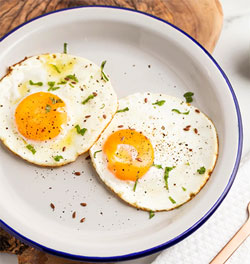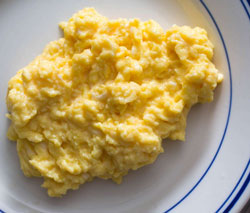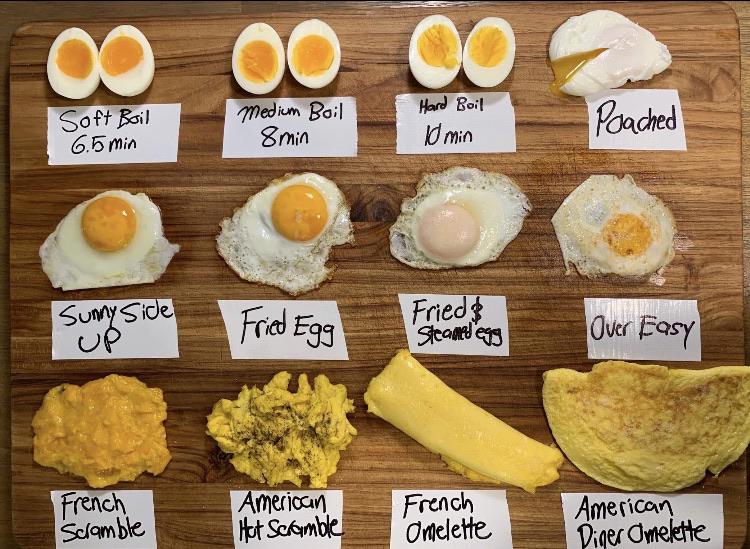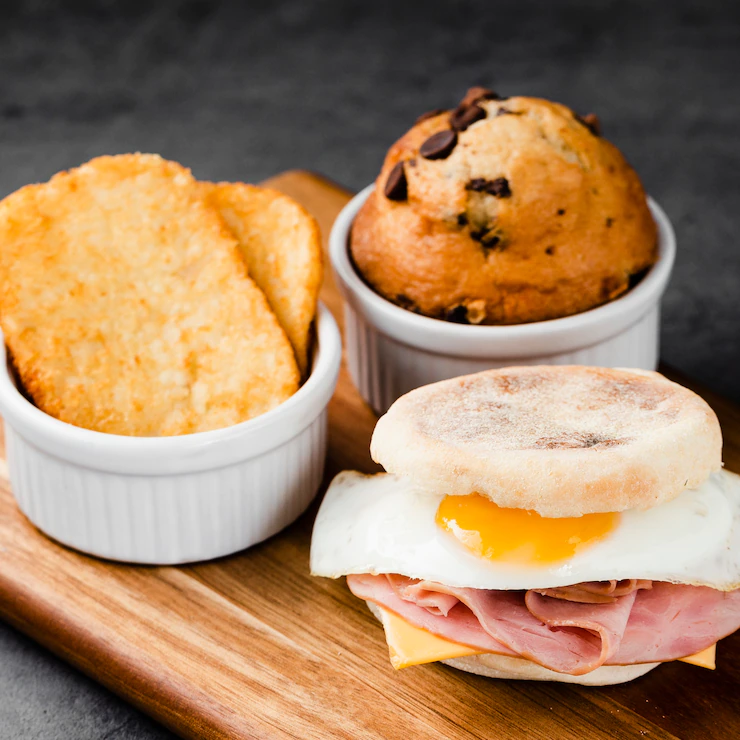صبحانه یکی از مهمترین وعده های غذایی محسوب می شود. در این وعده خوردنی های مختلفی سرو می شود. از آنجایی که در فرهنگهای مختلف، غذاهای مختلفی وجود دارند که در کشور ما مرسوم نیستند، با شنیدن کلمات مربوط به این غذاها، ما هیچ اطلاعاتی درباره آنها نداریم. گاهی وقتی سریال می بینیم و به این کلمات بر میخوریم و ترجمه یا دوبله سریال را می بینیم، متوجه می شویم چیزی که ترجمه شده است با آن چیزی که دیده می شود متفاوت است. علت اینجاست که هیچ کلمه معادلی برای آن غذا وجود ندارد.
در این موارد بهترین کار این است که غذا را با کلمه انگلیسی آن یاد بگیریم. برای همین یک مکالمه انگلیسی صبحانه را در این پست برای شما آماده کرده ایم. در این مکالمه می توانید با برخی از این غذاها آشنا شوید.
پیشنهادهای ویژه

نرم افزار آموزش مکالمه انگلیسی (ویژه اندروید)
با قابلیت تشخیص صدا و ترجمه فارسی

بسته کامل آموزش مکالمه زبان انگلیسی
شامل مجموعههای ویدویی و صوتی
🗣 How Would You Like Your Eggs (دوست داری تخم مرغت چطور باشه؟)
A: Wow, you’re up early today! What’s for breakfast?
واو! امروز زود بیدار شدی! صبحونه چی هست؟
B: Well, I felt like baking, so I made some muffins.
خب، من امروز حس و حال پختن داشتم (می خواستم بپزم، دوست داشتم بپزم)، برای همین تعدادی مافین (کلوچه) درست کردم.
A: Smells good! I’ll make some coffee. Do you want me to make you some eggs?
بوی خوبی دارند! من [هم] کمی قهوه درست می کنم. می خوای برات یکم تخم مرغ درست کنم؟
B: Sure, I’ll take mine, sunny side up.
البته، من دوست دارم مال خودم زرده اش هم نخوره*.
A: Eww, I don’t know how you can eat your eggs like that! Ever since I was small, I’ve had eggs and soldiers.
ایش، من نمی دونم چطوری تخم مرغ رو دوست داری اینجوری بخوری! من از وقتی کوچیک بودم، تخم مرغ و نون تست* می خوردم.
B: You know, my dad had scrambled eggs every morning for twenty years. It drove my mom crazy!
می دونی، پدر من بیست سال هر روز صبح، تخم مرغ همزده می خورد. مامان من رو دیوونه کرده بود!
A: You know what really drives me crazy? When I ask for soft boiled eggs, and they overcook them, so they come out hard boiled! How can you dip your toast into a hard boiled egg?
می دونی چی منو بیشتر دیوونه (اذیت) می کنه؟ وقتی تخم مرغ عسلی می خوام و برام بیش از حد می پزنش و تبدیل میشه به تخم مرغ پخته. چطوری میتونی نون تست رو بزنی داخل تخم مرغ پخته؟!
B: You’re so picky sometimes.
تو بعضی موقع ها خیلی مشکل پسندی.
A: Here you go, honey, fried eggs.
بفرما عزیزم، تخم مرغ نیمرو
B: Dammit! I asked for sunny side up! How many times do I have to tell you.
لعنتی! من درخواست نیمرو با زرده هم نزده داشتم! چند بار باید این رو به تو بگم.
🗝️ لغات انگلیسی مهم مکالمه
🔹 bake: پختن نان، پختن در فر
🔹 muffin: نوعی کلوچه

🔹 sunny-side up: تخم مرغ نیمرو با زرده هم نزده

🔹 eggs and soldiers:
کلمه soldier به معنی سرباز است. در زبان انگلیسی بریتیش، در حوزه غذا، به نان های تست که به صورت باریک بریده شده باشند soldier می گویند. همچنین eggs and soldiers نوعی خوراکی است که با پختن تخم مرغ به صورت عسلی (یا کمی شل تر) درست می شود. سپس موقع خوردن، نان های تست را داخل زرده می زنند و می خورند.

🔹 scrambled eggs: نوعی از درست کردن تخم مرغ، که هنگام سرخ کردن، زرده و سفیده را کامل هم می زنند.

🔹 soft boiled egg: تخم مرغ پخته با زرده به صورت عسلی یا کمی شلتر
🔹 hard boiled egg: تخم مرغ پخته با زرده کاملا پخته شده
🔹 picky: سخت گیر، مشکل پسند
🔹 egg: تخم مرغ
🔹 hen: مرغ
🔹 over-easy: تخم مرغ نیمرو که از دو طرف سرخ می شود اما زرده باز نمی شود
🔹 omlete:
توجه کنید کلمه املت برای تخم مرغ با املت ما در فارسی متفاوت است. املت به نوعی از درست کردن تخم مرغ می گویند که ابتدا آن را کاملا هم می زنند سپس سرخ می کنند و از وسط تا می کنند
🔹 yolk: زرده تخم مرغ
🔹 egg white: سفیده تخم مرغ
🔹 frying pan: ماهیتابه
انواع تخم مرغ
در تصویر فوق می توانید انواع درست کردن تخم مرغ را در کشورهای غربی ببینید.

پیشنهادهای ویژه

نرم افزار آموزش مکالمه انگلیسی (ویژه اندروید)
با قابلیت تشخیص صدا و ترجمه فارسی

بسته کامل آموزش مکالمه زبان انگلیسی
شامل مجموعههای ویدویی و صوتی
🎧 پادکست صوتی آموزش انگلیسی
متن پادکست
Hello English learners. Welcome back. My name is Marco. And I’m Erica. And today we’re going to be bringing you a lesson about eggs. That’s right. And who knew? There was so much
to talk about when we’re talking eggs. Right. Well, we always have eggs for breakfast and there are many ways of preparing them. So we’re going to learn what the different ways
are. Yes. And we’ll learn some of the language that goes along with eggs. Okay. So we have three words that we want to take a look at before we listen to our dialogue. So let’s
look at these in vocabulary preview. Vocabulary preview. Our preview word for this lesson is picky. Picky. Picky. Picky. So picky is an interesting adjective. Okay. So if a person is picky, what does that mean? They’re very hard to please. Okay. So if your boss is picky
and you give him a report and maybe it has, I don’t know, a couple of mistakes or something.
Yeah, he’ll say, do it again. Do this, this and this. Okay. So if you are picky, you want everything to be perfect. Okay. And if there’s one small thing that’s not, you won’t, you
won’t be happy. Okay. So picky. Interesting word. Now our next word. Yoke. Yoke. Yoke.
Y-O-L-K. Yoke. So this word is actually not in the dialogue. It’s not in the dialogue, but it’s important that you know, right? Okay. So if you have an egg, the yellow part is called
the yolk. Okay. And what about the other part? The white. The white. The white. Or also called the egg white, right? Yes. Egg white. Okay. So pretty simple. Yoke and egg white. Let’s
listen to our dialogue. We are going to be listening to a couple who are having breakfast.
Wow, you’re up early today. What’s for breakfast? Well, I felt like baking, so I made some muffins.
Smells good. I’ll make some coffee. Do you want me to make you some eggs?
Sure. I’ll take mine sunny side up. I don’t know how you can eat your eggs like that. Ever since I was small, I’ve had eggs and soldiers. You know, my dad had scrambled eggs every morning
for 20 years. It drove my mom crazy. You know what really drives me crazy? When I ask for soft boiled eggs and they overcook them so they come out hard boiled. How can you dip
your toast into a hard boiled egg? You’re so picky sometimes. Here you go, honey. Fried eggs.
Damn it. I said sunny side up. How many times do I have to tell you?
Well, she is definitely very picky and has a very bad temper. I know. I can’t believe anyone would get so angry over their breakfast. Yeah, yeah. But I guess it is the most important meal of
the day. Exactly. So we heard a couple of different ways of describing how you prepare eggs. So let’s take a look at that in language takeaway. Language takeaway. Okay, so our first
preparation method. My favorite. All right. Sunny side up. Okay. Sunny side up. Sunny side up.
Now this is interesting. Sunny like the sun, right? Exactly. So when you fry an egg, right, and the yolk looks like a little sun, right? Yeah, exactly. So why is it called sunny side up?
I think because of what you just said. It looks like the sun. But you don’t cook the yolk, right?
Okay. Yeah. The yolk is still yellow. It’s still a little bit liquid. It’s a little bit soft.
Okay. Because the opposite would be a fried egg. Yes. And that’s our second word. Fried egg.
Fried egg. So this you put the egg in the pan and you cook it all the way through. All the way through. So the yolk is not liquid anymore. It becomes hardened. Yes. Right. Exactly. Okay.
A fried egg. A fried egg. All right. So now let’s take a look at our next set of eggs. All right.
Soft boiled egg. A soft boiled egg. Soft boiled. Soft boiled. Okay. So to boil, you put the egg in water. In boiling water. Yes. And make it cook. And make it cook. So how long would you usually
put it in for to be soft boiled? Three minutes. Four minutes. Okay. So you only cook part of the egg, right? Right. The yolk, the yellow part stays a little bit wet, a little bit liquid. Okay. So
again, the opposite would be a hard boiled egg. Hard boiled. Hard boiled. So hard boiled is when you cook the entire egg again. Yes. So then it’s hard like a ball. The entire egg. So with this soft
boiled and hard boiled eggs, this takes us to our next form, eggs and soldiers. Eggs and soldiers.
Eggs and soldiers. Eggs and soldiers. Now this is really interesting. I didn’t really know about this before. It kind of sounds like you’re having eggs with a group of soldiers with from the army.
Well, this is a very British way of eating eggs. So you have your soft boiled egg in a cup, and you have a piece of toast. But the toast is cut into long pieces. Okay. And then you take those
pieces and you dip them into the egg yolk. Delicious. It’s good. Yeah. Typical English way of eating eggs. Okay. So eggs and soldiers. Interesting. And this takes us to our last form of egg preparation
and probably the most popular. Yes. Scrambled eggs. Scrambled eggs. Scrambled eggs. Take eggs, put them in a pan, and then you just move them all over the place. Mix them all up. Mix them all.
So the yellow, so the yolk and the white are mixed together. Mixed together. All right.
So we’ve looked at a lot of egg preparation, and now we can listen to our dialogue for the second time. And then we’ll come back and look at some phrases. Wow, you’re up early today.
What’s for breakfast? Well, I felt like baking, so I made some muffins.
Smells good. I’ll make some coffee. Do you want me to make you some eggs? Sure.
Sure. I’ll take mine sunny side up. I don’t know how you can eat your eggs like that.
Ever since I was small, I’ve had eggs and soldiers. You know, my dad had scrambled eggs every morning for 20 years. It drove my mom crazy. You know what really drives me crazy?
When I asked for soft boiled eggs and they overcook them so they come out hard boiled.
How can you dip your toast into a hard boiled egg? You’re so picky sometimes.
Here you go, honey. Fried eggs. Damn it. I said sunny side up. How many times do I have to tell you?
Interesting that the man in this dialogue is the one doing the baking.
Yeah, well, that’s modern days. I don’t know. Men are learning how to cook and yeah.
Househusbands. Househusbands. Yeah, more popular. All right. Well, since this house husband felt like baking, I think we should look at this and one other phrase in Fluency Builder.
Okay, so great phrase. He said, I felt like baking. I felt like baking. I felt like baking.
So let’s take a look at this. He feels like or he felt like in the past. What does that mean?
When you feel like? You want to do it. You have the desire to do it. Okay. And then to bake.
And now this verb is in the gerund form. That’s right. The ing form. And that’s the rule, right?
I feel like playing soccer. Right. I feel like eating lunch. I felt like going to the movies.
That’s the way you would say this. You have the desire. You feel like doing something. Exactly.
Okay. Very good. And now let’s take a look at this second phrase. Drives me crazy. Drives me crazy.
Drives me crazy. All right. This is a very, very descriptive phrase. And I think if we listen to some examples, it will help us understand the meaning. Example one.
This music is driving me crazy. Turn it down. Example two.
Don’t leave garbage in my car. It drives me crazy.
Example three.
Your mom is driving me crazy. She keeps calling me.
All right. So if something drives you crazy, it makes you feel very angry or annoyed. Irritated.
Yeah. Frustrated. Okay. But it can also be positive, right? Like that girl drives me crazy.
As in you really, really, really like her. Yeah. I don’t know. It sounds a little bit inappropriate to me. Really? Yeah. I think it’s okay. Drives me crazy. I was like, she’s got me thinking and
she’s got me in the clouds or something like that. All right. Well, maybe there’s something about you that I don’t need to know. So I’ll let you keep that thought to yourself. All right. Well,
I’m just saying we could use it in a positive format. Okay. Okay. You’re just saying. I’m just saying. All right. So drives me crazy. Really great phrase. And you can use it in all of these
different situations like we heard. So let’s listen to our dialogue for the last time and then we’ll come back and talk a little bit more. Wow. You’re up early today. What’s for breakfast? Well,
I felt like baking. So I made some muffins. Smells good. I’ll make some coffee. Do you want me to make you some eggs? Sure. I’ll take mine sunny side up. I don’t know how you can eat your eggs
like that. Ever since I was small, I’ve had eggs and soldiers. You know, my dad had scrambled eggs every morning for 20 years. It drove my mom crazy. You know what really drives me crazy?
When I asked for soft boiled eggs and they overcooked them so they come out hard boiled.
How can you dip your toast into a hard boiled egg? You’re so picky sometimes. Here you go, honey. Fried eggs. Damn it. I said sunny side up. How many times do I have to tell you?
Well, I think there are some people who really, really love eating eggs for breakfast and some people who just can’t stand it. Yeah. I don’t know who though. I mean, who doesn’t like eggs in the
morning? I know. I’m a big fan. Right? Eggs, bacon, toast. Yes. Good stuff. Traditional American type breakfast. Now you were telling me that you have some traditions when you eat eggs. I know. I think,
I’m not sure if this is just in my family, but I think actually it might be common with other people as well. When you eat a soft boiled or hard boiled egg, you have to, you know,
eat all of the egg outside of the shell and then you have to break the bottom of the shell after you finished. Why? So that the fairies who live in your egg cup can come out. So it’s kind of like
a superstition. Yeah, I guess it is. Interesting. Yeah. So I don’t know. You guys, do you have any egg traditions or any other crazy food stories like that? Well, for example, I was telling you that
when I prepare scrambled eggs, sometimes I like to take some rice, some rice that has already been cooked, put it in the pan and then take some eggs, two eggs, put it on top of the rice and
scramble the rice with the eggs. Okay. For breakfast? Yeah, it could be for breakfast. Really? A little bit. Not like a huge plate of rice or maybe at night you don’t have anything to eat. Okay. Scramble
eggs with rice. It’s a poor man’s food. All right. Well, it’s also a quick man’s food. Yeah, exactly.
So, well, we’re out of time for today, but until next time, bye.





سایتتون واقعا عالیه از زحماتون سپاسگزارم فقط اگر ممکنه تعداد مکالمات رو افزایش بدید با موضوعات مختلف .سایت شما خیلی جای رشد و شکوفایی داره و میتونه یک سایت برتر باشه